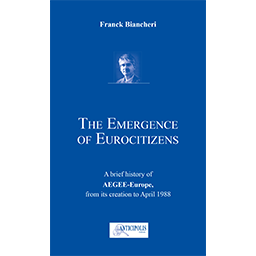One of the objectives of the AAFB is to promote the work done by Franck in the last 30 years. Current events definitely make this 2008 article extremely actual.
(deutsche Übersetzung –>)
In these times of rising global economic and financial crisis, at a time when the French elites wallow in an americanist [1], ultra-liberal model, which is in full implosion on the other side of the Atlantic [2], it may be useful to recall a fundamental equation of which the current generation of European leaders seems to ignore one of the terms: thanks to European integration and generalization of social security systems, Europe has managed to avoid its traditional civil wars since 60 year.
With the other terms, European integration and peace, no problem. The credo is well established and the slogan is repeated endlessly at any European political event: the referendum, the European anniversary, … in the publicity of the Commission. “Europe is peace” is even shown on posters [3]. Our current national elites do not understand the European project, but at least they have retained this basic idea, taught to them by the generation of their parents.
However ragarding the rest of the equation, that is to say the social security system, there they have forgotten everything.
Yet there is not need to be a great expert in European history to know, that social security systems, generalized to the entire population of a country, have been set up in Europe after the Second World War [4]. The three basic principles on which rest the European systems (which may vary in their practical implementation) are universality, unity and equality. And it is no coincidence that the “invention” of this modern social protection corresponds to the longest period of peace and prosperity on the European continent. Indeed, the rise of fascism in the 1930s had highlighted the serious threat to democracy and peace that represented millions of poor, jobless and without income, easy prey to dictators and xenophobic and ultra-nationalist ideologies. Beyond the moral and social demands, implementation of the social security system was also for the leaders of the post-war a way to remove the breeeding groupd of future Hitler, Mussolini, Petain …
Thus, contrary to the ideas “ready-made in Washington”, which our poor European elites have consumed during the last twenty years, it turns out that universal social protection is just as important as the European construction to the preservation of peace in Europe.
This does of course not mean that we should not adapt and transform social protection systems in Europe; on the contrary! Indeed they need to be improved to make them compatible with the European society of the 21st century. But to do this, we need to find an Einstein, who extends and develops the basic principles of gravitation discovered by Newton; not an Attila, who makes a clean sweep of everything he finds on his path. So the Americanism is Attila, not Einstein.
To realize this, it is sufficient to observe the results of twenty-five years experience of ultra-liberal americanist ideology:
– a rate of social inequality like in the Third World
– a third of Americans without health insurance (and this percentage is rising)
– life expectancy declining relative to other developed countries
– health expenditure per capita highest on the planet (and thus the Americanist model wastes even more money than rhe European systems)
– an education system in collapse.
And I’ll stop here for this article, which does not intend to make the autopsy of the “socio-economic Americanism”.
The principles put forward after 1945 to found the European social systems (universality, unicity and equality) are still relevant because they define a coherent system: everyone benefits from it, everyone is in the same “boat” and everyone receives as his neighbor. However, new dimensions and new methods must be integrated into the existing systems. The individualization of benefits and contributions is now feasible thanks to new information technologies, while the three fundamental principles need to be respected. A greater responsability of the actors of the system is possible, because the socio-economic education of the current and future generations is definitely more sophisticated. The interaction and evaluation of all parts of the system is now feasible by involving beneficiaries and providers.
Finally European solidarity, as socio-economic consequence of the Euro, will be the next dimension to be integrated into the European system of national social security systems. This is also one of the components of the major axes of the socio-economic program recently adopted by the members of Newropeans.
Other developments are certainly needed. But in any case, we Europeans must keep in mind that the sorcerer’s apprentice who praise us Americanist failure as a model want to ignore that the dismantling of our social security systems “à l’Européenne” lead straight to the unevitable return of the grandsons of Hitler, Pétain, Franco, Mussolini and Stalin. The captains of industry ans the generals love the armies of the poor who have nothing to lose! They are docile and without principles.
Franck Biancheri (24/01/2008)
President Newropeans
[1] see about this subject my article in Newropeans-Magazine: “Europe: La trahison des élites – Les Américanistes sont les pires amis des Américains”
[2] It is sufficient to check the shocking Attali report (http://www.liberationdelacroissance.fr/files/rapports/rapportCLCF.pdf), a collection inspired by a perfect Americanist vision of society: not a word about Europe, attack according to all rules of art on social or local solidarity, Paris-centric vision, bias toward the interests of large distribution groups or franchise networks, reducing the citizen to consumer, … and a litany on “growth”, a sort of deity to which history, culture and citizenship must be sacrificed. This is certainly a perfect recipe for creating a “France subprime” as we now already have a “United States subprime”, “third-worlded” countries with an ultra-rich minority, an anemic middle class and large class of poors.
[3] See the following articles: 1936: Nazism brings Peace/1956: Communism is Peace/2006: Europe makes Peace & Europe 2009: Quand les petits-fils d’Hitler, de Pétain, de Franco et de Mussolini prendront pouvoir: Europe 2020 archives: https://www.europe2020.org/spip.php?article49
[4] Initiated by Bismarck in Germany in the late 19th century to counter the influence of the socialist and communist movements, the system has been formalized in the UK in its modern form by William Beveridge in the early 1940s based on 3 key principles: universality, unicity, equality. It has been generalized into the whole Europe after 1945.
————————————————————————————————————————————————–
(deutsche Übersetzung)
In dieser Zeit der sich verschärfenden globalen wirtschaftlichen und sozialen Krise, in einem Moment, in dem die französischen Eliten sich in einem amerikanistischen [1], ultra-liberalen Modell suhlen, das jenseits des Atlantiks [2] gerade in sich zusammenfällt, wollen wir an eine fundamentale Gleichung erinnern und daran, dass die heutige Generation der europäischen Politiker und Manager ein Element der Gleichung offensichtlich ignoriert: Warum haben die Europäer denn seit sechzig Jahren ihre traditionellen Bürgerkriege vermieden? Weil wir Europa aufgebaut haben und über soziale Sicherungssysteme für große Bevölkerungsschichten verfügen.
Mit den anderen Komponenten, also dem Frieden und der EU, haben die Politiker und Manager kein Problem. Der Glaube ist gut verankert und der Slogan wird bei jedem x-beliebigen europäischen Politik-Ereignis endlos wiederholt: Bei der Volksabstimmung über die Europäische Verfassung, beim Jahrestag der EU-Gründung, … in der Werbung der Kommission. „Europa bedeutet Frieden“ wird sogar auf Plakaten proklamiert [3]. Unsere jetzigen, nationalstaatlich ausgerichteten Eliten verstehen nichts vom europäischen Projekt, aber sie haben wenigstens diese grundlegende Idee, die ihnen von der Generation ihrer Eltern beigebracht wurde, in ihre Vorstellungswelt integriert.
Aber was den Rest der Gleichung anbelangt, nämlich die Sozialsysteme, da haben sie offensichtlich alles vergessen.
Man muss kein ausgewiesener Fachmann für europäische Geschichte sein, um zu wissen, dass die auf alle Bevölkerungsteile ausgeweiteten sozialen Sicherungssysteme in Europa nach dem zweiten Weltkrieg [4] eingeführt wurden. Die drei grundlegenden Prinzipien, auf die sich die europäischen Systeme stützen (auch wenn sie sich im Einzelnen unterscheiden), sind Allgemeingültigkeit, Einheitlichkeit und Gleichheit. Und es ist kein Zufall, dass die “Erfindung” dieser modernen sozialen Absicherung der längsten Periode des Friedens und des Wohlstands auf dem europäischen Kontinent entspricht. In der Tat hat der Aufstieg des Faschismus in den dreißiger Jahren beleuchtet, welche ernste Gefahr für die Demokratie und den Friedens die Millionen von Armen darstellen, arbeitslos und ohne Einkommen, eine leichte Beute für Diktatoren und fremdenfeindliche und ultranationalistische Ideologien. Die Implementierung der sozialen Sicherungssysteme war für die Staats- und Regierungschefs der Nachkriegszeit nicht nur ein moralisches und soziales Gebot, sondern auch ein Mittel, den zukünftigen Hitler, Mussolini, Petain, … den politischen Nährboden zu entziehen.
Also, im Gegensatz zu den Schmalspurideen, die unsere armseligen europäischen Eliten seit zwei Jahrzehnten eins zu eins und unreflektiert aus den Washingtoner Denkfabriken abkupfern: Für die Bewahrung des Friedens in Europa sind unsere allgemeinen sozialen Sicherungssysteme genauso wichtig wie der Prozess der europäischen Integration.
Damit will ich natürlich nicht sagen, dass die sozialen Sicherungssysteme in Europa nicht angepasst und umgestaltet werden müssen. Ganz im Gegenteil: Sie müssen in der Tat verbessert werden, um sie kompatibel mit der europäischen Gesellschaft des 21. Jahrhunderts zu machen. Aber dafür brauchen wir einen Einstein, der die grundlegenden von Newton entdeckten Prinzipien der Schwerkraft erweitert und entwickelt, und nicht einen Attila, der „tabula rasa“ mit allem macht, was er auf seinem Weg vorfindet. Die Ideologie der amerikanischen Konservativen, das ist Attila, nicht Einstein.
Dafür genügt ein Blick auf die Ergebnisse von fünfundzwanzig Jahren Erfahrung mit der ultra-liberalen Ideologie der amerikanischen Rechten:
– soziale Unterschiede wie in Ländern der dritten Welt
– ein Drittel der Amerikaner ohne soziale Absicherung (und der Anteil steigt)
– eine im Vergleich zu den anderen Industrieländern rückläufige Lebenserwartung
– die pro Kopf der Bevölkerung weltweit höchsten Gesundheitsausgaben (also verschwendet das amerikanistische Modell noch mehr Geld als die europäischen Systeme)
– ein zusammenbrechendes Bildungssystem.
Für diesen Artikel breche ich hier ab, den es geht hier nicht darum, die Autopsie des „sozio-ökonomischen Amerikanismus“ vorzunehmen.
Die Grundsätze, die 1945 als Grundlage für die europäischen Sozialsysteme festgelegt wurden (Allgemeingültigkeit, Einheitlichkeit und Gleichheit), sind immer noch aktuell, da sie ein kohärentes System definieren: jeder profitiert von ihm, jeder sitzt im gleichen „Boot“ und jeder bekommt etwas genauso wie sein Kollege. Auf der anderen Seite ist es notwendig, in die vorhandenen Systeme neue Dimensionen und neue Methoden zu integrieren. Individuelle Leistungen und Beiträge sind jetzt realisierbar mit den neuen Informationstechnologien, wobei die drei Grundprinzipien respektiert werden müssen. Eine größere Selbstverantwortung der Akteure des Systems ist möglich, da die jetzigen und kommenden Generationen besser sozial-ökonomisch ausgebildet sind. Das Zusammenspiel und die Bewertung der verschiedenen Systemteile sind jetzt machbar unter Einbeziehung der Nutznießer und der Leistungsträger.
Schließlich wird die europäische Solidarität, als sozio-ökonomische Konsequenz des Euro, die nächste Dimension sein, die in das europäische System der nationalen sozialen Sicherungssysteme integriert werden muss. Dies ist im Übrigen ein Bestandteil des sozio-ökonomischen Programms, das kürzlich von den Newropeans-Mitgliedern verabschiedet wurde.
Weitere Entwicklungen sind zweifellos notwendig. Aber auf jeden Fall müssen wir Europäer uns vergegenwärtigen, dass die Zauberlehrlinge, die uns das amerikanistische Scheitern als Vorbild anpreisen, nicht wahrhaben wollen, dass die Zerschlagung unserer sozialen Sicherungssysteme europäischer Prägung direkt zum unaufhaltsamen Aufstieg der Enkel von Hitler, Petain, Franco, Mussolini und Stalin führen wird. Industriekapitäne und Generäle lieben die Armeen der Armen, die nichts zu verlieren haben! Sie sind fügsam und ohne Prinzipien.
Franck Biancheri (24. 1. 2008)
Präsident von Newropeans
[1] Vgl. zu diesem Thema meinen Artikel im Newropeans Magazin: Europe: La trahison des élites – Les Américanistes sont les pires amis des Américains
[2] Es genügt den empörenden Bericht der Attali-Kommission zu lesen (benannt nach dem ehemaligen Wirtschaftsberater von Francois Mitterand, Jacques Attali, dem von Nicolas Sarkozy die Aufgabe übertragen wurde, einen Aktionsplan zur “Befreiung des Wachstums” zu erstellen; Anmerkung des Übersetzers), eine Zusammenstellung von Maßnahmen inspiriert von einer perfekten amerikanistischen Vision der Gesellschaft: Kein Wort über Europa, Angriff nach allen Regeln der Kunst auf die Systeme der sozialen und lokalen Solidarität, eine Paris-zentrierte Vision der Dinge, Parteiergreifung für die Interessen der großen Einzelhandelsketten- oder Franchiseunternehmen, Reduzierung des Bürgers zum Verbraucher, … und ein Loblied auf das „Wachstum“, eine Art Gottheit, der man Geschichte, Kultur und Recht auf politische Teilhabe opfern muss. Es ist auf jeden Fall das perfekte Rezept, um ein „subprime Frankreich“ zu erzeugen, so wie man bereits jetzt „subprime Vereinigte Staaten“ hat, Länder, in denen sich die Zustände an die Dritte Welt annähern, mit einer ultra-reichen Minderheit, einer schrumpfenden Mittelschicht und einer breiten Klasse der Armen.
[3] Siehe die folgenden Artikel: 1936: Der Nationalsozialismus bringt den Frieden; 1956: Kommunismus ist Frieden; 2006: Europa schafft Frieden & Europe 2009: Quand les petits-fils d’Hitler, de Pétain, de Franco et de Mussolini prendront pouvoir: Europe 2020 archives: https://www.europe2020.org/spip.php?article49
[4] Eingeführt von Bismarck in Deutschland am Ende des 19. Jahrhunderts um den Einfluss der sozialistischen und kommunistischen Bewegungen zu bekämpfen, wurde das System in seiner modernen Form im Vereinigten Königreich von William Beveridge zu Beginn der vierziger Jahre formalisiert, gestützt auf die drei Schlüsselprinzipien Allgemeingültigkeit, Einheitlichkeit, Gleichheit. Vergleichbare Systeme wurden in ganz Europa nach 1945 eingeführt.
Un des objectifs de l’AAFB étant de promouvoir les oeuvres de Franck Biancheri, voici un article écrit par Franck en 2008, frappant d’actualité.
En ces temps de montée de crises économique et financière mondiales, à un moment où les élites françaises se vautrent dans un modèle américaniste[1] ultra-libéral, pourtant en pleine implosion outre-Atlantique[2], il peut être utile de rappeler une équation fondamentale dont l’actuelle génération de dirigeants européens semble vouloir ignorer l’un des termes : c’est grâce à la construction européenne et à la généralisation des systèmes de protection sociale que l’Europe a réussi à éviter ses traditionnelles guerres civiles depuis 60 ans.
Pour ce qui est de la construction européenne et de la paix, pas de problème. Le credo est bien ancré et le slogan est répété sans fin à l’occasion du moindre événement politique européen : référendum, anniversaire européen, … pub de la Commission. « L’Europe c’est la paix » se décline même en affiche[3]. Nos actuelles élites nationales ne comprennent rien au projet européen, mais elles ont au moins retenu cette idée basique que leur a enseignée la génération de leurs parents.
Mais en revanche, pour ce qui est du reste de l’équation, à savoir la Sécu, là ils n’ont visiblement rien retenu.
Pourtant, il n’est pas besoin d’être un grand expert de l’histoire européenne pour constater que les systèmes de protection sociale généralisés à toute la population d’un pays se sont mis en place en Europe après la Seconde Guerre Mondiale[4]. Les trois principes fondamentaux sur lesquels s’appuient les systèmes européens (qui peuvent varier en termes opérationnels) sont l’universalité, l’unicité et l’égalité. Et ce n’est pas un hasard si l’ « invention » de cette protection sociale moderne correspond à la plus longue période de paix et de prospérité du continent européen. En effet, la montée des fascismes au cours des années 1930 avait mis en lumière le grave danger pour la démocratie et pour la paix que représentaient des millions de pauvres, sans travail et sans revenus, proies faciles des dictateurs et des idéologies xénophobes et ultranationalistes. Au-delà des exigences morales et sociales, la mise en oeuvre de la Sécu, c’était aussi pour les dirigeants de l’après-guerre un moyen de couper l’herbe sous les pieds des futurs Hitler, Mussolini, Pétain…
Ainsi, contrairement aux idées « ready-made in Washington » que consomment depuis une vingtaine d’années nos piètres élites européennes, il s’avère que la protection sociale universelle est toute aussi importante que la construction européenne à la préservation de la paix en Europe.
Ceci ne veut bien entendu pas dire qu’il ne faut pas adapter et transformer les systèmes de protection sociale en Europe; bien au contraire! Il faut en effet les améliorer afin de les rendre compatibles avec la société européenne du 21ème siècle. Mais pour ce faire, il s’agit de trouver un Einstein qui étend et développe les principes de base de la gravitation découverts par Newton; et non pas un Attila qui fait table rase de tout ce qu’il trouve sur son passage. Or l’Américanisme, c’est Attila; pas Einstein.
Il suffit de constater aujourd’hui les résultats de vingt cinq ans d’expérience idéologique ultra-libérale américaniste, pour s’en rendre compte:
-
un taux d’inégalité sociale équivalent aux pays du tiers-monde
-
un tiers des Américains sans couverture sociale (et cette proportion est en hausse)
-
une espérance de vie en régression par rapport aux autres pays développés
-
des dépenses de santé par habitant les plus importantes de la planète (donc le modèle américaniste gaspille encore plus d’argent que les systèmes européens)
-
un système éducatif en plein effondrement.
Et je m’arrêterai là pour cet article qui n’a pas vocation à faire l’autopsie de l’ «américanisme socio-économique».
Les principes mis en avant après 1945 pour fonder les systèmes sociaux européens sont toujours d’actualité (universalité, unicité et égalité) car ils définissent un système cohérent:
tout le monde en bénéficie, tout le monde est dans le même « bateau » et chacun reçoit comme le voisin. En revanche, de nouvelles dimensions et de nouvelles méthodes doivent être intégrées aux systèmes en place. L’individualisation des prestations et des cotisations est désormais réalisable grâce aux nouvelles technologies de l’information, tout en respectant les trois principes fondamentaux. La responsabilisation des acteurs du système est possible grâce à l’éducation socio-économique nettement plus sophistiquée des générations actuelles et à venir. L’interaction et l’évaluation de pans entiers des systèmes sont désormais faisables en impliquant les usagers et les prestataires.
Enfin la solidarité européenne, du fait notamment des conséquences socio-économiques de l’Euro, sera la prochaine dimension à intégrer dans le système européen des systèmes nationaux de protection sociale. C’est d’ailleurs l’une des composantes des grands axes du programme socio-économique récemment adopté par les membres de Newropeans.
D’autres développements sont certainement nécessaires. Mais, dans tous les cas, nous Européens, devons garder à l’esprit que les apprentis sorciers qui nous vantent l’échec américaniste comme un modèle à suivre veulent ignorer que le démantèlement de nos systèmes de protection sociale « à l’Européenne » conduira tout droit au grand retour des petits-fils d’Hitler, Pétain, Franco, Mussolini et Staline. Les capitaines d’industrie comme les généraux adorent les armées de pauvres qui n’ont rien à perdre! Elles sont dociles et sans principes.
Franck Biancheri (24/01/2008)
Président Newropeans
[1] cf. à ce sujet mon article dans Newropeans-Magazine: Europe: La trahison des élites – Les Américanistes sont les pires amis des Américains
[2] Il suffit de consulter le consternant rapport Attali (http://www.liberationdelacroissance.fr/files/rapports/rapportCLCF.pdf) recueil inspiré par une parfaite vision américaniste de la société : pas un mot sur l’Europe, attaque en règle des processus de solidarité sociale ou locale,
vision parisio-centriste, parti pris pour les intérêts des grands groupes de distribution ou réseaux de franchise, réduction du citoyen au consommateur, … et litanie sur la « croissance », sorte de déité à laquelle il faut sacrifier histoire, culture et citoyenneté. C’est en tout cas une recette parfaite pour créer une « France subprime » comme on a déjà désormais des « Etats-Unis subprime », des pays « tiers-mondisés » avec une minorité ultra-riche, une classe moyenne anémique et une large classe de pauvres.
[3] Voir les articles suivants: 1936: Le Nazisme apporte la Paix; 1956: Le Communisme c’est la paix; 2006: L’Europe fait la Paix & Europe 2009: Quand les petits-fils d’Hitler, de Pétain, de Franco et de Mussolini prendront pouvoir, Europe 2020 archives: https://www.europe2020.org/spip.php?article49
[4] Initié par Bismark en Allemagne à la fin du 19° siècle pour contrer l’influence des mouvements socialistes et communistes, le système est formalisé au Royaume-Uni sous sa forme moderne par William Beveridge au début des années 1940 en s’appuyant sur 3 principes-clés : universalité, unicité, égalité. Il se généralise dans toute l’Europe après 1945.




